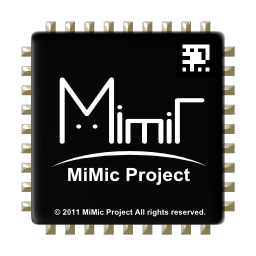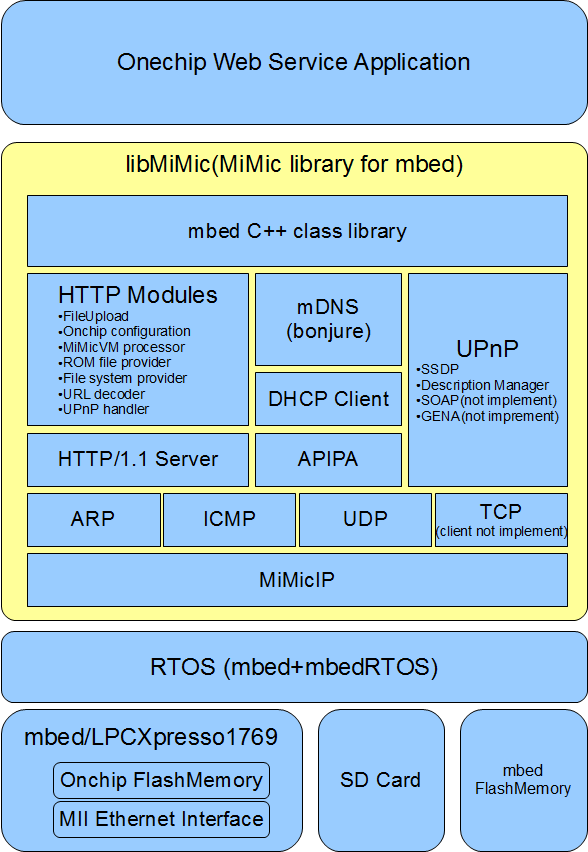This is Webservice SDK for mbed. LPCXpresso1769/LPC1768/FRDM-K64F/LPC4088
Dependents: MbedFileServer_1768MiniDK2 RedWireBridge IssueDebug_gcc MiMicRemoteMCU-for-Mbed ... more

libMiMic(MiMic library for mbed)は、WebService機能を提供するSDKです。 mbedでWebAPIに対応したネットワークデバイスを簡単に作ることが出来ます。
libMiMicはMiMic projectで開発しています。MiMic projectについてはこちらをご覧ください。 http://nyatla.jp/mimic/wp/
構成
libMiMicはmbedRTOS上で動作し、ユーザアプリケーションにAPIを提供します。コアAPIはC言語で記述されていますが、使用頻度の高いものについてはmbed向けのC++APIが準備されています。

※libMiMicはmbedの標準イーサネットドライバをしようしていません。
標準イーサネットドライバと同時に使用することはできません。
- MiMicIP - IPv4スタックです。レテンシとメモリ消費量を抑えたuipベースのライブラリです。
- ARP/ICMP/UDP/TCP - 基礎的なソケットAPIを提供します。APIは独自です。
- HTTP/1.1 Server - HTTP/1.1に対応したサーバです。マルチセッション・Chunked・持続性接続に対応しています。
- HTTP Modules - HTTP/1.1の機能モジュールです。以下のモジュールがあります。
- ROM file provider - ROMに格納したファイルイメージを公開します。
- File system provider - mbedファイルシステムを公開します。
- Onchip configuration - プログラムフラッシュを利用して設定を保存します。
- MiMicVM processor - RPCリクエスト(MiMicVM)を処理します。
- FileUpload - ファイルアップロードを受け取ります。
- URL decoder - HTTPリクエストを解析します。
- UPnP handler -UPnPメッセージを処理します。
- WebSocket - Websocketサーバです。
- mDNS - マルチキャストDNSサービスです。
- UPnP - UPnP/1.0の機能を提供します。UPnP handlerと協調して動作します。(現在はデバイス探索(SSDP)・デスクリプション(Description)のみ実装してあります。)
- DHCP/APIPA - ゼロコンフィギュレーション用のモジュールです。
- HTTP/1.1 Client
- mbed C++ class library - mbed向けのC++CPIです。C言語のものより簡単です。
対応機種
- mbed(mbed LPC1768)
- LPCXpresso1769
プログラム
Import programMiMicRemoteMCU-for-Mbed
MiMic RemoteMCU for mbed. This program provides MCU control API over REST API. It can control MCU from Javascript,PHP or any HTTP rest client directly. And, The application has self development environment.
Import programMbedFileServer
The program publishes files at local directory and SD filesystem. It is a full-fledged webServer somewhat.
サンプル
Import programMiMicSimpleHttpd
This is a simplest HTTP server made of libMiMic. It will echo back a request path.
Import programUPnPBasicDevice
Simplest UPnP basic device example. This program to run UPnP basic device on the mbed.
Import programWebSocketSample
MiMicSDK Websocket module sample program.
Import programHttpClientSamlpe
A http client sample program.
Import programTcpSocketClientSamlpe
MiMicSDK Tcp client socket sample program.
Import programUdpSocketSamlpe
Udp socket sample program. This program will send back the received packet.
チュートリアル
- HTTPD解説
- UPnPデバイスの作り方
- MiMicRemoteMCUの紹介(pdf)
- MiMicRemoteMCUのマニュアル(pdf)
English
libMiMic(MiMic library for mbed) is SDK which provides Webservice functions. It can be created networking device easily using mbed.
See more MiMic information, See MiMic project website. http://nyatla.jp/mimic/wp/
Structure
libMiMic run on mbed RTOS and provides networking API to user application. This library has C++ class API for the mbed, and low-level C language API.

For WebService general, it can be written in a simple C + + API.
libMiMic does not have the standard Ethernet driver of mbed. It is not possible that will be used with the standard Ethernet driver.
- MiMicIP - IPv4 protocol stack. This is based uip which is reduced memory and latency.
- ARP / ICMP / UDP / TCP - Those are provide basic IP protocols.
- HTTP/1.1 Server - The Http server compatible HTTP/1.1. It supports multi-session, chunked transport, persistent connection.
- HTTP Modules - There are addon-module for HTTP server. The following modules.
- ROM file module - Publish the file images in ROM.
- File system module - Publish thefiles in mbed file system.
- Onchip configuration module - To save the network settings to the program flash via REST.
- MiMicVM module - To handle the (MiMicVM) RPC request.
- FileUpload module - Accept a file via HTTP POST.
- URL dedoce module - A versatility URL decoder.
- UPnP handle module - To handle UPnP messages.
- UPnP - This provides UPnP/1.0 device functions. It works together with UPnP handler.
- Websocket - websocket (version13) server
- mDNS Service - DNS-SD protocol server.
- UPnP - This provides UPnP/1.0 device functions which works with UPnP handler. (You have been implemented (SSDP) ? description only (Description) device search now.) It is a module zero configuration for - DHCP / APIPA. mbed C + + class library - C of mbed for + + is the CPI. It is simple than that of the C language.
- DHCP/APIPA - It support zero-cpnfigulation.
- mbed C++ class library. Almost APIs for Web applications are available.
- HTTP/1.1 Client
Supported target
- mbed(mbed LPC1768)
- LPCXpresso1769
Application
Import programMiMicRemoteMCU-for-Mbed
MiMic RemoteMCU for mbed. This program provides MCU control API over REST API. It can control MCU from Javascript,PHP or any HTTP rest client directly. And, The application has self development environment.
Import programMbedFileServer
The program publishes files at local directory and SD filesystem. It is a full-fledged webServer somewhat.
Sample
Import programMiMicSimpleHttpd
This is a simplest HTTP server made of libMiMic. It will echo back a request path.
Import programUPnPBasicDevice
Simplest UPnP basic device example. This program to run UPnP basic device on the mbed.
Import programWebSocketSample
MiMicSDK Websocket module sample program.
Import programHttpClientSamlpe
A http client sample program.
Import programTcpSocketClientSamlpe
MiMicSDK Tcp client socket sample program.
Import programUdpSocketSamlpe
Udp socket sample program. This program will send back the received packet.
Tutorial
- HTTPD hello world.
- How to make own UPnP device.
- MiMicRemoteMCUの紹介(pdf)
- MiMicRemoteMCUのマニュアル(pdf)
core/driver/flash/k64f/K64F_IAP.c
- Committer:
- nyatla
- Date:
- 2014-10-01
- Revision:
- 92:4f77028cce64
File content as of revision 92:4f77028cce64:
/**
* Copyright 2014 MiMicProject
* Licensed under the Apache License, Version 2.0 (the "License");
* you may not use this file except in compliance with the License.
* You may obtain a copy of the License at
*
* http://www.apache.org/licenses/LICENSE-2.0
*
* Unless required by applicable law or agreed to in writing, software
* distributed under the License is distributed on an "AS IS" BASIS,
* WITHOUT WARRANTIES OR CONDITIONS OF ANY KIND, either express or implied.
* See the License for the specific language governing permissions and
* limitations under the License.
*/
/**
* This file based on https://mbed.org/users/Sissors/code/FreescaleIAP/
*/
#include "NyLPC_config.h"
#if NyLPC_MCU==NyLPC_MCU_K64F
#include "K64F_IAP.h"
//For K64F
# include "MK64F12.h"
# define USE_ProgramPhrase 1
# define FTFA FTFE
# define FTFA_FSTAT_FPVIOL_MASK FTFE_FSTAT_FPVIOL_MASK
# define FTFA_FSTAT_ACCERR_MASK FTFE_FSTAT_ACCERR_MASK
# define FTFA_FSTAT_RDCOLERR_MASK FTFE_FSTAT_RDCOLERR_MASK
# define FTFA_FSTAT_CCIF_MASK FTFE_FSTAT_CCIF_MASK
# define FTFA_FSTAT_MGSTAT0_MASK FTFE_FSTAT_MGSTAT0_MASK
enum FCMD {
Read1s = 0x01,
ProgramCheck = 0x02,
ReadResource = 0x03,
ProgramLongword = 0x06,
ProgramPhrase = 0x07,
EraseSector = 0x09,
Read1sBlock = 0x40,
ReadOnce = 0x41,
ProgramOnce = 0x43,
EraseAll = 0x44,
VerifyBackdoor = 0x45
};
#define INT_FALSE (0!=0)
#define INT_TRUE (0==0)
static inline void run_command(void);
//static int check_boundary(int address, unsigned int length);
static int check_align(int address);
static K64F_IAP_TIAPCode verify_erased(int address, unsigned int length);
static K64F_IAP_TIAPCode check_error(void);
static K64F_IAP_TIAPCode program_word(int address, char *data);
K64F_IAP_TIAPCode K64F_IAP_erase_sector(int address) {
#ifdef IAPDEBUG
printf("IAP: Erasing at %x\r\n", address);
#endif
if (check_align(address))
return K64F_IAP_TIAPCode_AlignError;
//Setup command
FTFA->FCCOB0 = EraseSector;
FTFA->FCCOB1 = (address >> 16) & 0xFF;
FTFA->FCCOB2 = (address >> 8) & 0xFF;
FTFA->FCCOB3 = address & 0xFF;
run_command();
return check_error();
}
K64F_IAP_TIAPCode K64F_IAP_program_flash(int address, char *data, unsigned int length) {
#ifdef IAPDEBUG
printf("IAP: Programming flash at %x with length %d\r\n", address, length);
#endif
if (check_align(address))
return K64F_IAP_TIAPCode_AlignError;
K64F_IAP_TIAPCode eraseCheck = verify_erased(address, length);
if (eraseCheck != K64F_IAP_TIAPCode_Success)
return eraseCheck;
K64F_IAP_TIAPCode progResult;
for (int i = 0; i < length; i+=8) {
progResult = program_word(address + i, data + i);
if (progResult != K64F_IAP_TIAPCode_Success)
return progResult;
}
return K64F_IAP_TIAPCode_Success;
}
unsigned int K64F_IAP_flash_size(void) {
unsigned int retval = (SIM->FCFG2 & 0x7F000000u) >> (24-13);
if (SIM->FCFG2 & (1<<23)) //Possible second flash bank
retval += (SIM->FCFG2 & 0x007F0000u) >> (16-13);
return retval;
}
static K64F_IAP_TIAPCode program_word(int address, char *data) {
#ifdef IAPDEBUG
printf("IAP: Programming word at %x, %d - %d - %d - %d - %d - %d - %d - %d\r\n", address, data[0], data[1], data[2], data[3], data[4], data[5], data[6], data[7]);
#endif
if (check_align(address)){
return K64F_IAP_TIAPCode_AlignError;
}
FTFA->FCCOB0 = ProgramPhrase;
FTFA->FCCOB1 = (address >> 16) & 0xFF;
FTFA->FCCOB2 = (address >> 8) & 0xFF;
FTFA->FCCOB3 = address & 0xFF;
FTFA->FCCOB4 = data[3];
FTFA->FCCOB5 = data[2];
FTFA->FCCOB6 = data[1];
FTFA->FCCOB7 = data[0];
FTFA->FCCOB8 = data[7];
FTFA->FCCOB9 = data[6];
FTFA->FCCOBA = data[5];
FTFA->FCCOBB = data[4];
run_command();
return check_error();
}
/* Clear possible flags which are set, run command, wait until done */
static inline void run_command(void) {
//Clear possible old errors, start command, wait until done
__disable_irq(); //Disable IRQs, preventing IRQ routines from trying to access flash (thanks to https://mbed.org/users/mjr/)
FTFA->FSTAT = FTFA_FSTAT_FPVIOL_MASK | FTFA_FSTAT_ACCERR_MASK | FTFA_FSTAT_RDCOLERR_MASK;
FTFA->FSTAT = FTFA_FSTAT_CCIF_MASK;
while (!(FTFA->FSTAT & FTFA_FSTAT_CCIF_MASK));
__enable_irq();
}
/* Check if no flash boundary is violated
Returns true on violation *//*
static int check_boundary(int address, unsigned int length) {
int temp = (address+length - 1) / K64F_IAP_SECTOR_SIZE;
address /= K64F_IAP_SECTOR_SIZE;
int retval = (address != temp);
#ifdef IAPDEBUG
if (retval)
printf("IAP: Boundary violation\r\n");
#endif
return retval;
}*/
/* Check if address is correctly aligned
Returns true on violation */
static int check_align(int address) {
int retval = address & 0x03;
#ifdef IAPDEBUG
if (retval)
printf("IAP: Alignment violation\r\n");
#endif
return retval;
}
/* Check if an area of flash memory is erased
Returns error code or Success (in case of fully erased) */
static K64F_IAP_TIAPCode verify_erased(int address, unsigned int length) {
#ifdef IAPDEBUG
printf("IAP: Verify erased at %x with length %d\r\n", address, length);
#endif
if (check_align(address)){
return K64F_IAP_TIAPCode_AlignError;
}
//Setup command
FTFA->FCCOB0 = Read1s;
FTFA->FCCOB1 = (address >> 16) & 0xFF;
FTFA->FCCOB2 = (address >> 8) & 0xFF;
FTFA->FCCOB3 = address & 0xFF;
FTFA->FCCOB4 = (length >> 10) & 0xFF;
FTFA->FCCOB5 = (length >> 2) & 0xFF;
FTFA->FCCOB6 = 0;
run_command();
K64F_IAP_TIAPCode retval = check_error();
if (retval == K64F_IAP_TIAPCode_RuntimeError) {
#ifdef IAPDEBUG
printf("IAP: Flash was not erased\r\n");
#endif
return K64F_IAP_TIAPCode_EraseError;
}
return retval;
}
/* Check if an error occured
Returns error code or Success*/
static K64F_IAP_TIAPCode check_error(void) {
if (FTFA->FSTAT & FTFA_FSTAT_FPVIOL_MASK) {
#ifdef IAPDEBUG
printf("IAP: Protection violation\r\n");
#endif
return K64F_IAP_TIAPCode_ProtectionError;
}
if (FTFA->FSTAT & FTFA_FSTAT_ACCERR_MASK) {
#ifdef IAPDEBUG
printf("IAP: Flash access error\r\n");
#endif
return K64F_IAP_TIAPCode_AccessError;
}
if (FTFA->FSTAT & FTFA_FSTAT_RDCOLERR_MASK) {
#ifdef IAPDEBUG
printf("IAP: Collision error\r\n");
#endif
return K64F_IAP_TIAPCode_CollisionError;
}
if (FTFA->FSTAT & FTFA_FSTAT_MGSTAT0_MASK) {
#ifdef IAPDEBUG
printf("IAP: Runtime error\r\n");
#endif
return K64F_IAP_TIAPCode_RuntimeError;
}
#ifdef IAPDEBUG
printf("IAP: No error reported\r\n");
#endif
return K64F_IAP_TIAPCode_Success;
}
#endif

 MiMic Webservice library
MiMic Webservice library